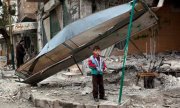 A boy stands in the ruins of a shop in the centre of Idlib, northern Syria, where Human Rights Watch says there has been government atrocities. Photograph: Rodrigo Abd/AP A boy stands in the ruins of a shop in the centre of Idlib, northern Syria, where Human Rights Watch says there has been government atrocities. Photograph: Rodrigo Abd/AP
|
 The UN's Syria mission must monitor human rights abuses if it is to succeed The UN's Syria mission must monitor human rights abuses if it is to succeed
I heard accounts of executions by government forces in northern Syria – those responsible must be held accountable
Last week I visited several towns in Idlib, a governorate in northern Syria attacked by government forces during late March and early April, to interview those claiming to be victims and witnesses to government atrocities, on behalf of Human Rights Watch.
While there we documented accounts of executions of at least 35 people and the burning and destruction of hundreds of houses, shops, cars and other private property. The reported violations were shockingly brazen. In one street in Taftanaz, a small town of 15,000, pro-government militias appeared to have executed 16 people, most of them from the same family. In many cases the government forces seem to have deliberately burned and destroyed houses belonging to activists or opposition fighters as a form of punishment.
Shockingly, the way government forces operated indicates that they were not concerned at all that they might have to answer for their actions. In several cases witnesses told us they had recognised the soldiers who detained those who were later executed, as local agents for one of Syria's many security agencies.
But if the security forces counted on people being too afraid to tell their stories, they were mistaken.
Before going to Syria we expected many people to be too afraid to talk to us. After all, the Syrian authorities have brutally cracked down on critics, detaining and torturing people just for contacting a media outlet. Even in the towns that are currently under opposition control, the army and intelligence services are never far away, and the government's recent attacks show that the opposition fighters are not capable of preventing these forces from entering the towns.
And it's true, some people were afraid. Most of those we spoke to were convinced that it was just a matter of time before the government forces launched new attacks, rumours of which sent them fleeing to neighbouring villages or across the border to Turkey. But for most we spoke to, anger and defiance towards the government trumped their fear. The vast majority of victims and witnesses insisted that we tell their stories and many also wanted us to use their names, even though they knew that it could put them at risk (we nonetheless refrained from publishing their names in many cases). One woman with eight children, for example, insisted that we report how government forces burned down her house and houses owned by her husband's four brothers.
People in these areas also frequently organised public demonstrations. In a town close to where we stayed, about 150 people, including many children, participated in a night rally, chanting anti-government slogans and calling for President Assad to leave. The scene reminded me more of a big festival than an area under threat of being attacked. We saw the same scene in another town after Friday prayer last week.
Not only have the government's heavy-handed and abusive tactics failed to repress political opposition, they have also failed to stamp out the armed insurgency. While initially driven out of the towns by the government's military operation, opposition fighters returned as soon as government forces moved on to the next town, returning the situation, we were told, to pretty much what it was before the attacks. When we visited, government forces were mainly staying in their bases while opposition fighters manned checkpoints at town entrances and moved around freely inside.
Right now, the world's eyes are on Kofi Annan's plan, the ceasefire, and the UN's observer mission being deployed to Syria. The presence of observers may reduce the number of people killed, and it is important that the mission is appropriately staffed and equipped to be as effective as possible. But any peace efforts will be seriously undermined if the government continues to blatantly commit abuses against its own population. Instead of scaring people into submission, the abuses committed during recent attacks in Idlib seem to have only strengthened opposition to the government.
That's why it is imperative that the UN mission currently deployed in Syria has a human rights monitoring component and that investigations and accountability for war crimes and crimes against humanity are a key part of the solution to the crisis in the country. Only then will it be possible to talk about a solution to the crisis in Syria.
(2012-05-03/guardian)
|





 A boy stands in the ruins of a shop in the centre of Idlib, northern Syria, where Human Rights Watch says there has been government atrocities. Photograph: Rodrigo Abd/AP
A boy stands in the ruins of a shop in the centre of Idlib, northern Syria, where Human Rights Watch says there has been government atrocities. Photograph: Rodrigo Abd/AP